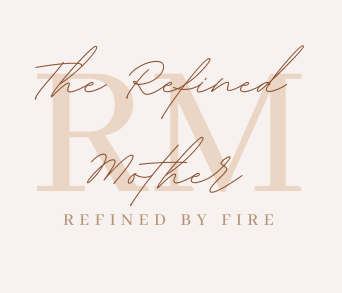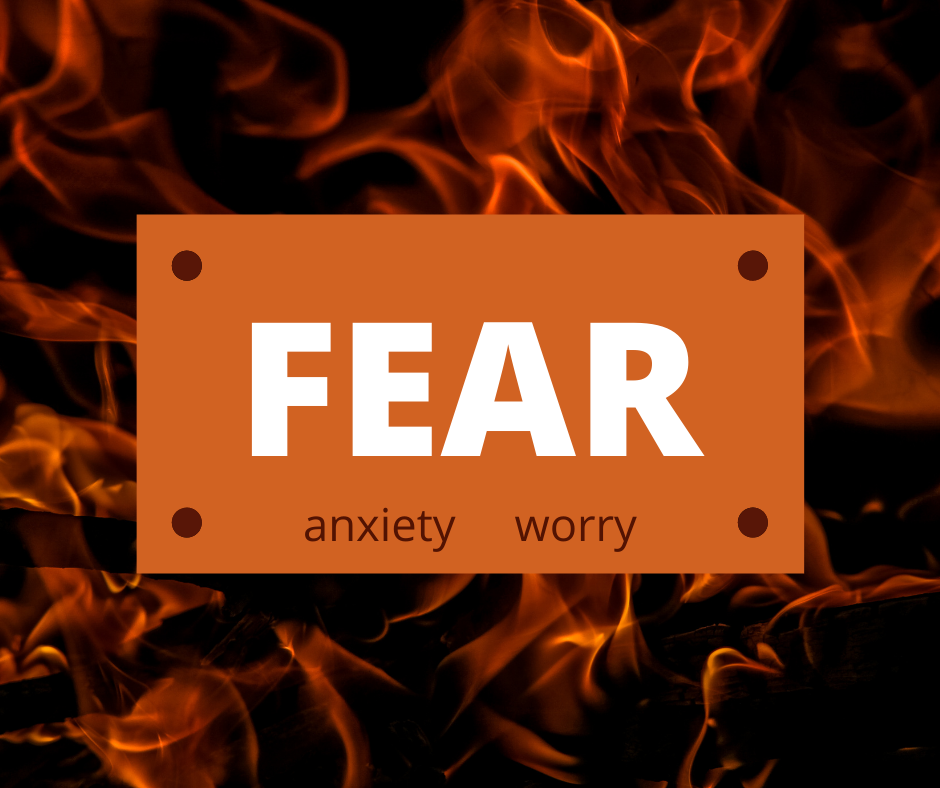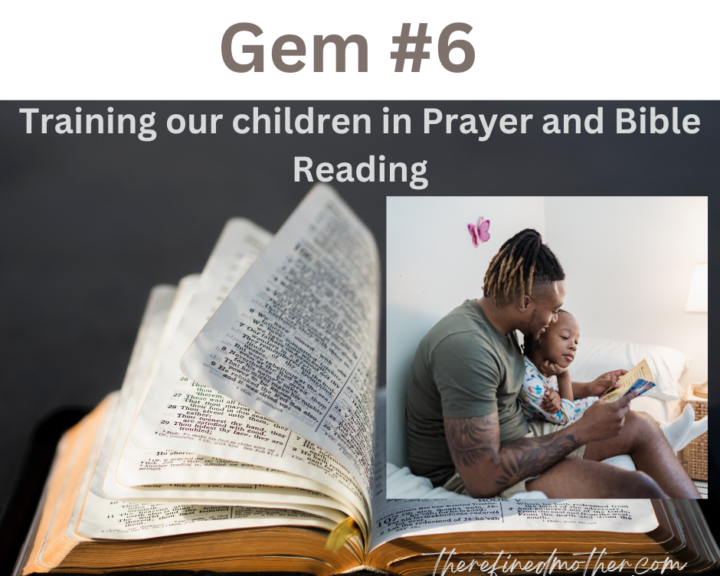Fear, anxiety and worry are words that are commonplace in our conversations today. In fact we are seeing them in epidemic proportions. This isn’t surprising considering our fast pace of life, high expectations we place on ourselves and others, countless opportunities on offer, technology and social media, as well as stressful local and global events.
Most of us are familiar with the many verses in scripture that tell us not to fear, worry or be anxious. Some say that the concept “do not fear” comes up 365 times in The Bible – once for each day of the year. I love that idea, though apparently it is not factual. The phrase “Fear not” itself occurs just over 100 times in the Old Testament, and 44 times in the New Testament which alone indicates that The Lord was very serious that we should NOT fear.
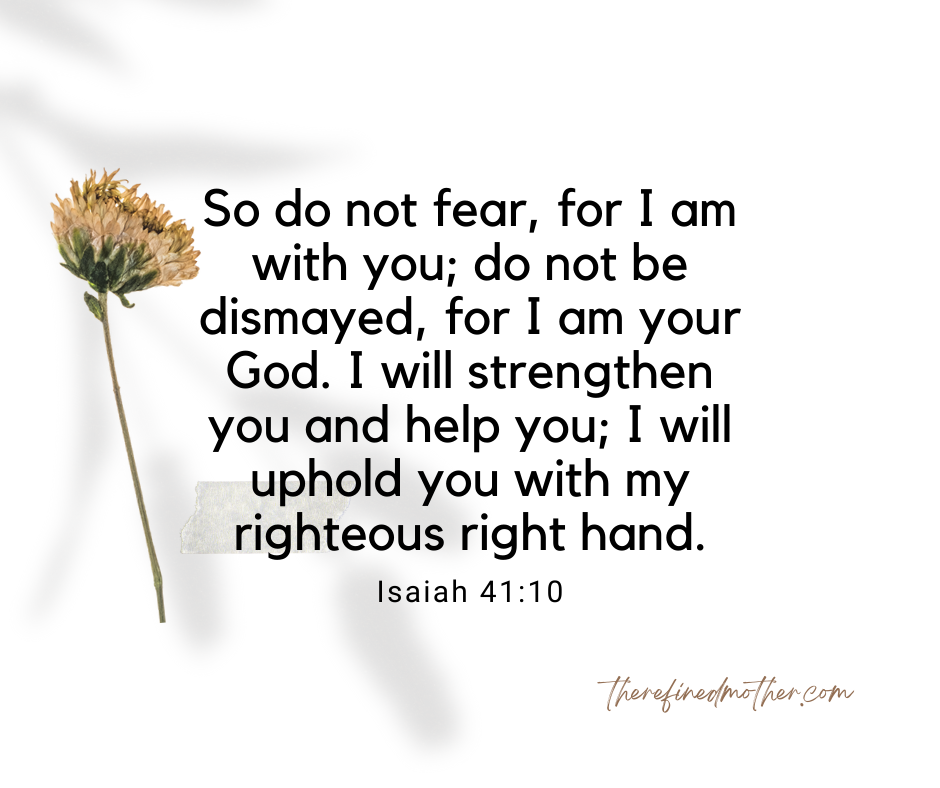
Why shouldn’t we fear?
I have understood, from the context of the different verses on fear, that primarily, when we fear, or are anxious, it is indicative of not fully trusting God. And He wants us to trust Him. I have also understood the negative consequences of fear and anxiety on our health and functioning, and Our Lord wants to protect us from ill-health and would have us functioning according to His design for us.
I would like to make it clear that this post is a study of the Word about fear and its implications for us, and is not a condemnation on anyone experiencing fear or anxiety or excessive worry. We are imperfect beings and we struggle in so many areas. This should never hold us back from knowing the Word of God and seeking with His help to attain freedom from fear and anxiety, whether by prayer and supplication alone, or with the help of counselling or carefully considered medication. (God made medicine and doctors!)
Some of my recent readings in Exodus and Jeremiah have made me aware of the profound impact of fear in our lives that we don’t often consider. Take a meander through these life stories with me, and gain some interesting insight.
Pharaoh and Fear
Exodus 1 relays the state of affairs in Egypt when the Israelites (having been brought to Egypt in Joseph’s time) were slaves and were multiplying exponentially, because of God’s favour on them.
Exodus 1:12 (GNV) “But the more the Egyptians oppressed the Israelites, the more they increased in number and the farther they spread through the land. The Egyptians came to fear the Israelites ”
The Egyptians began to FEAR the Israelites to the extent that “Then Pharaoh, the king of Egypt, gave this order to the Hebrew midwives, Shiphrah and Puah: “When you help the Hebrew women as they give birth, watch as they deliver. If the baby is a boy, kill him; if it is a girl, let her live.”(Exodus 1:15-16 NLT)
Pharoah’s fear was not grounded in anything ACTUAL. It was based on a “what if?”. What if the Israelites outnumber us? What if they overpower us. None of it had eventuated, but his “what if” fear led him to make a terrible decision. To murder innocent babies.
Our fear can lead us to make poor decisions. Watch out for the what ifs. What if it rains tomorrow? What if my husband is not happy with me? What if they think I’m lazy? What if we never stop fighting? What if they think my children are badly behaved? What if they die? What if I die? What if I have an accident….. What if is rooted in fear. When we react out of fear, we can be rash and hasty, and sin against Him. God’s many reminders for us not to fear, are also to help us make sound decisions, not fear based, irrational decisions, that can cause us to sin against Him and others. IF the “what ifs” happened…wouldn’t He still be God, and wouldn’t He still be in control?
The Midwives and Fear
But because the midwives feared God, they refused to obey the king’s orders. They allowed the boys to live, too.
Exodus 1:17 (NLT)
The midwives feared, too. But they did not fear man. They did not fear outcomes, or personal loss or threat. They feared GOD. This fear is a good fear. It is the only fear endorsed in the Bible. A healthy fear of The Lord amounts to our humble response to our mighty King. A respect which acknowledges His power over all things. And fear of The Lord displaced their fear of man (a powerful man, for sure, in this instance) and allowed them to make a sound, God honouring decision – to disobey Pharaoh, obey God and save the babies.
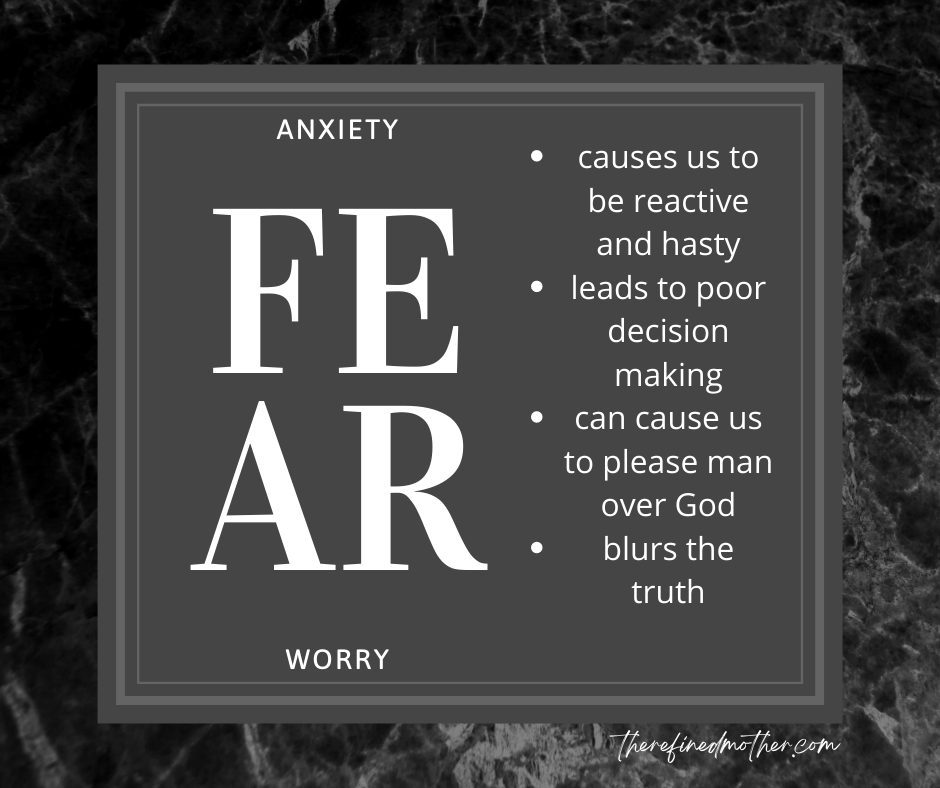
King Zedekiah and Fear
Jeremiah served faithfully in Judah as a prophet of The Lord, during the time of the divided Kingdom. The people of Judah were sinful and would not turn from their wicked ways, no matter how often or urgently the Lord warned them, through Jeremiah. Jeremiah passed on the message of terrible destruction that would come on the people if they did not turn, repent and follow The Lord. On hearing these messages, the people turned on Jeremiah. They did not like what he was saying, and he suffered flogging, imprisonment and ridicule. Suffering at the hands of the Babylonians was eminent and in Jeremiah 38, we see God continuing to extend grace, by warning the people that surrendering to the Babylonians, was going to be their best course of action.
“This is what the LORD says: ‘Everyone who stays in Jerusalem will die from war, famine, or disease, but those who surrender to the Babylonians will live. Their reward will be life. They will live!’
Jeremiah 38:2 (NLT)
Of course the people didn’t like what he said and with the approval of King Zedekiah, he was thrown into an empty cistern, where he sank into the thick layer of mud at the bottom. Now an Ethiopian man, named Ebed-Melech, heard that Jeremiah was in the cistern, and knew he would die down there. He courageously approached the king to challenge his decision and requested to take Jeremiah out. The king agreed, and Ebed-Melech, helped by others, took Jeremiah out of the cistern.
A while later, King Zedekiah called for Jeremiah.
One day King Zedekiah sent for Jeremiah and had him brought to the third entrance of the LORD’s Temple. “I want to ask you something,” the king said. “And don’t try to hide the truth.”
Jeremiah 38:14 (NLT)
Jeremiah was accustomed to the kind of abusive treatment he received whenever he delivered the truth and said, ““If I tell you the truth, you will kill me. And if I give you advice, you won’t listen to me anyway.” Jeremiah 38:15
But King Zedekiah reassured him that he would be safe. So Jeremiah told him the message from the Lord:
“This is what the LORD God of Heaven’s Armies, the God of Israel, says: ‘If you surrender to the Babylonian officers, you and your family will live, and the city will not be burned down. But if you refuse to surrender, you will not escape! This city will be handed over to the Babylonians, and they will burn it to the ground.’”
Jer 38:17-18 (NLT)
“But I am afraid to surrender,” the king said… (Jer 38:19)
and we read in the very next chapter:
When King Zedekiah and all the soldiers saw that the Babylonians had broken into the city, they fled. They waited for nightfall and then slipped through the gate between the two walls behind the king’s garden and headed toward the Jordan Valley.
But the Babylonian troops chased the king and caught him on the plains of Jericho. They took him to King Nebuchadnezzar of Babylon, who was at Riblah in the land of Hamath. There the king of Babylon pronounced judgment upon Zedekiah. He made Zedekiah watch as they slaughtered his sons and all the nobles of Judah. Then they gouged out Zedekiah’s eyes, bound him in bronze chains, and led him away to Babylon.
Jer 39:4-7 (NLT)
King Zedekiah was afraid to surrender. The Lord had spelled it out, but he chose to trust his fear instead of trusting the Lord, and the end result was much worse than what he had feared originally.
God can ask us to do things which seem scary, but we know what we are facing and we face them with His support and approval. When we do not trust God in the face of fear, we face the unknown, alone.
Let’s contrast this to Jeremiah and Ebed-melech and their fear journey.
Jeremiah, Ebed-melech and fear
Jeremiah was well experienced with the consequences of passing on messages from The Lord. He was never met with appreciation or applause. Yet, even after beatings, imprisonment, ridicule and muddy cistern treatment, he faced his fears once more when he stood before the king with the unpopular message to surrender. As a human being, like me and you, we can assume he was terrified. His comments confirm that he was hesitant to tell the king what he wanted to hear. Yet his trust and faithfulness to The Lord, meant he did it anyway. He did it, afraid.
We know from the story of Esther, that approaching a king was not for the faint of heart, yet Ebed-melech not only approached the king, but essentially criticised his prior approval of having Jeremiah thrown in the cistern in the first place. He also faced danger from all those who so furiously threw Jeremiah in the cistern because of his talk “undermining the morale of the troupes”. Ebed-melech was convicted of the right thing to do, and in the face of much danger and personal harm, he did it, afraid.
We saw how King Zedekiah’s story ended. Not very well. What was the outcome then as Jerusalem fell, for Jeremiah and Ebed-melech?
King Nebuchadnezzar had told Nebuzaradan, the captain of the guard, to find Jeremiah. “See that he isn’t hurt,” he said. “Look after him well, and give him anything he wants.”
Jer 39:11-12 (NLT)
Jeremiah was allowed to go free and to choose whether he wanted to stay in Judah or go to Babylon. The Lord rewarded his faithfulness.
The LORD had given the following message to Jeremiah while he was still in prison: “Say to Ebed-melech the Ethiopian, ‘This is what the LORD of Heaven’s Armies, the God of Israel, says: I will do to this city everything I have threatened. I will send disaster, not prosperity. You will see its destruction, but I will rescue you from those you fear so much. Because you trusted me, I will give you your life as a reward. I will rescue you and keep you safe. I, the LORD, have spoken!’”
Jer 39:15-18 (NLT)
Ebed-melech’s trust was seen by God and He stepped in to save him because he had trusted the Lord!
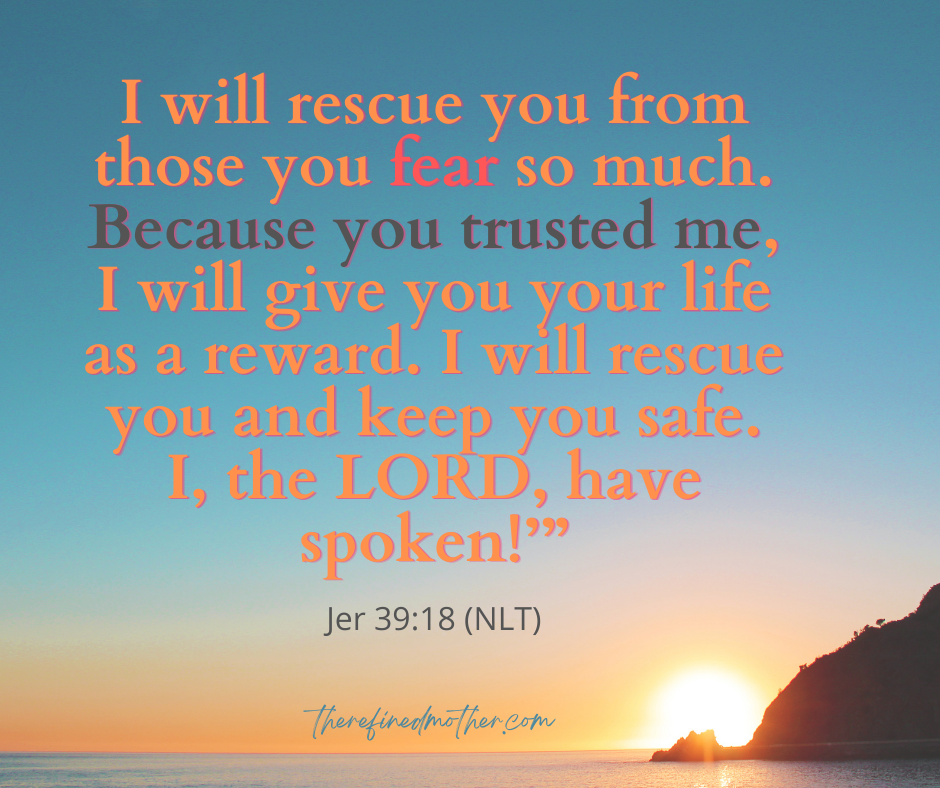
Fear and me
Obeying The Lord can be scary. To submit to my husband. To wait on The Lord. To rest. To confess. To ask forgiveness. To apologise.
When we want to get things done, our way..it feels scary to stop and do it His way. And sometimes, because His ways are higher than our ways, what He asks us to do, doesn’t always make sense to us.
And then there are the answers to prayer that seem scary. To move. To stay. To reach out.To be vulnerable. To forgive. To stay silent. To speak truth. To take a job. To leave a job. To homeschool. To send your child to school.
And I’m sure you could add a scary situation you are facing currently – an illness, a break up, a loss, loneliness, addiction, despair, confrontation.
Look at King Zedekiah. It’s scarier to do it without Him. We can face anything God asks us to do, because He is with us, not against us.
Have I not commanded you? Be strong and courageous. Do not be afraid; do not be discouraged, for the Lord your God will be with you wherever you go.”
Joshua 1:9 (NIV)
Let’s follow the example of Jeremiah and Ebed-melech. Don’t let fear get in the way of seeing His truth. Don’t let fear stop you from obeying and trusting The One who holds you in the palm of his hand.
